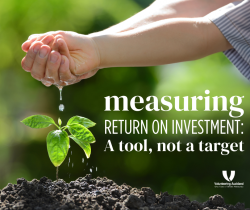The ROI of Volunteering: A Measure of Impact or a Metric for Funders?

As the community and non-profit sectors face increasing pressure to demonstrate value and accountability, the concept of Return on Investment (ROI) in volunteering has gained attention. Traditionally applied in the business world to assess financial performance, ROI in a volunteering context refers to the measurable benefits—social, economic, or community-based—that result from investing time and resources into volunteer programmes. But does applying ROI thinking to volunteering serve volunteers and communities, or does it primarily cater to funders and stakeholders?
Understanding ROI in Volunteering
ROI in volunteering can take many forms. It might involve calculating the monetary value of volunteer hours contributed, the cost savings to an organisation, or the outcomes achieved in the community. For example, if a team of volunteers contributes 500 hours to a beach clean-up initiative, the ROI might be represented in terms of hours saved for council staff, tons of rubbish removed, and the long-term environmental impact.
In New Zealand, organisations like Volunteering New Zealand have explored ways to measure the broader social value of volunteering, such as enhanced community cohesion, improved mental health, and strengthened civil society. These outcomes are harder to quantify but are essential to capturing the full ROI picture.
The Benefits of an ROI Approach
1. Strengthens the Case for Funding:
One of the main drivers for measuring ROI in volunteering is to demonstrate impact to funders, government agencies, and stakeholders. With accurate data, organisations can show that every dollar invested in volunteer coordination returns multiple times that value in community benefit, justifying continued or increased support.
2. Informs Strategic Decision-Making:
ROI data can help organisations understand what’s working and where improvements are needed. It allows leaders to allocate resources more effectively, identify high-impact roles, and streamline training and onboarding processes.
3. Elevates Volunteer Management:
When organisations invest in evaluating ROI, it highlights the need for strong volunteer leadership and infrastructure. It encourages robust systems for tracking hours, recognising contributions, and aligning roles with organisational goals.
4. Offers Recognition of Volunteer Effort:
Volunteers often underestimate the value of their time. By translating hours and outcomes into meaningful statistics, organisations can provide tangible evidence of impact that reinforces the value of each volunteer’s contribution.
Potential Downsides of the ROI Approach
1. Risk of Reducing Volunteering to Numbers:
One of the key concerns with ROI frameworks is the risk of reducing rich, human-centred experiences to monetary values. Volunteers are not unpaid staff—they are community members giving time, passion, and energy for causes they believe in. A narrow ROI focus may devalue roles that are emotionally impactful but harder to measure.
2. Prioritising Funders Over Volunteers:
ROI measurements can become inward-looking—focusing on what funders want to see rather than what volunteers need or gain. There’s a danger of shaping programmes solely to generate favourable statistics, overlooking roles that foster inclusion, learning, or community connection.
3. Data Collection Burden:
Gathering robust data for ROI analysis takes time, tools, and capacity that many small organisations lack. Without adequate resources, ROI efforts can fall short or become a distraction from the actual work of supporting volunteers and communities.
Making ROI Work for Everyone: Practical Approaches
To ensure ROI serves volunteers as well as funders, a balanced and values-led approach is required. Here are practical ways organisations in New Zealand and beyond can undertake meaningful ROI assessment:
1. Include Volunteer Outcomes in ROI
Rather than only counting outputs (e.g., hours worked), organisations should measure outcomes for volunteers themselves—such as increased confidence, new skills gained, or a sense of purpose. Simple post-volunteering surveys or interviews can yield valuable insights.
2. Use Mixed Methods
Combine quantitative data (hours, savings, numbers served) with qualitative feedback (stories, testimonials, reflections). A case study showing how a youth volunteer found career direction can be as powerful as a chart of hours logged.
3. Align ROI with Values
Keep your organisation’s mission and values at the centre of measurement. If inclusion, empowerment, and wellbeing are key goals, ensure ROI indicators reflect these rather than only financial metrics.
4. Involve Volunteers in Evaluation
Ask volunteers what they consider success. Invite them to co-design evaluation tools and reflect on what impact means to them. This participatory approach strengthens engagement and trust.
5. Use Existing Tools and Frameworks
Organisations like Volunteering Australia and the UK’s NCVO have developed volunteer ROI tools that include social return on investment (SROI) models. These tools can be adapted to the New Zealand context with input from local funders and communities.
6. Share Results Transparently
Publish ROI findings in annual reports, newsletters, or social media, not only for funders but also for volunteers and the community. When people see the ripple effect of their contribution, they are more likely to stay engaged.
Conclusion: A Tool, Not a Target
ROI should be seen as a tool for storytelling, improvement, and advocacy—not just a target for compliance. When used thoughtfully, ROI can help community organisations in New Zealand demonstrate value, attract support, and improve volunteer experiences. But the real return lies in people—the connections formed, confidence built, and communities strengthened. Any ROI framework must reflect that richness and stay grounded in the principles of service, inclusion, and shared purpose.
By embracing a holistic view of ROI, we can better honour volunteers’ contributions while building strong, sustainable, and evidence-based volunteer programmes that thrive well into the future.

